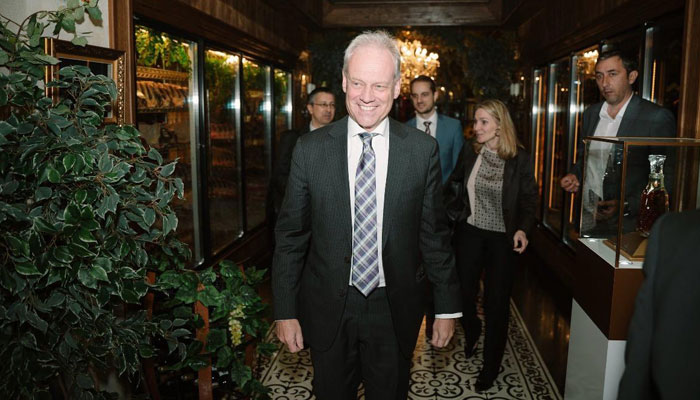EU, US urge Georgia to halt ‘foreign agents’ bill, keep moving towards West
TBILISI: A senior European Union official told the Georgian government on Thursday that its proposed legislation on “foreign agents” was “unacceptable”, and the White House said it was deeply concerned about how the proposal would affect free speech in Georgia.
The comments highlighted alarm in Washington and Brussels as the bill - attacked by opponents as authoritarian and Kremlin-inspired - completed the second of three required readings in the Georgian parliament.
The ruling Georgian Dream party says the law, which would require organisations receiving more than 20% of their funding from abroad to register as agents of foreign influence, is needed to ensure transparency. The party’s billionaire founder said this week that Georgia must defend its sovereignty against Western attempts to dictate to it.
Big crowds have protested nightly for weeks outside the parliament in Tbilisi, while inside lawmakers have sometimes come to blows.
Another demonstration was planned for Thursday evening.
The standoff is seen as part of a wider struggle that could determine whether Georgia, a country of 3.7 million people that has seen war and revolution since the fall of the Soviet Union, moves closer towards Europe or back under Moscow’s influence.
Gert Jan Koopman, director general of the European Commission’s enlargement directorate, reiterated the EU’s warning that the bill would put at risk Georgia’s hopes of becoming a member of the bloc.
“There are concerning developments in terms of legislation. The law ... as it stands is unacceptable and will create serious obstacles for the EU accession path,” he told a news conference in Tbilisi.
Koopman said “the ball is very firmly in the court of the government”, adding it still had time to change course.
But the government - which put forward a similar law last year, only to withdraw it in the face of protests - has shown no sign it will climb down for a second time, which would be humiliating ahead of a parliamentary election in October.
Britain, Italy, Germany and the United States have also criticised the bill.
The White House expressed concerns on Thursday about the chilling effect such legislation could have on Georgians’ ability and willingness to express themselves.
“We are deeply concerned about this legislation - what it could do in terms of stifling dissent and free speech,” White House national security spokesman John Kirby said at a briefing.
Earlier, U.S. Ambassador Robin Dunnigan said the Georgian government’s choices “have moved the country away from its Euro-Atlantic future” and urged it to recommit to integration with the West.
In a statement, Dunnigan said senior U.S. leaders had invited Georgia to discuss the issue, but that the country had not accepted the offer.
Georgia’s parliament on Wednesday approved the second reading of the bill, which the opposition says is modelled on a law the Kremlin has used to crack down on opponents in Russia.
Parliamentary debates on Thursday were cancelled after what officials called an “attack” on the legislature.
Tens of thousands of protesters had shut down central Tbilisi late on Wednesday in the largest anti-government rally yet. Police fired tear gas and stun grenades to clear some of the demonstrators.
Reuters eyewitnesses saw protesters barricade an entrance to the parliament building, preventing riot police from firing water cannon from within the fortress-like, Soviet-built complex.
-
 'Elderly' Nanny Arrested By ICE Outside Employer's Home, Freed After Judge's Order
'Elderly' Nanny Arrested By ICE Outside Employer's Home, Freed After Judge's Order -
 Keke Palmer On Managing Growing Career With 2-year-old Son: 'It's A Lot'
Keke Palmer On Managing Growing Career With 2-year-old Son: 'It's A Lot' -
 Key Details From Germany's Multimillion-euro Heist Revealed
Key Details From Germany's Multimillion-euro Heist Revealed -
 David E. Kelley Breaks Vow To Cast Wife Michelle Pfeiffer In 'Margo's Got Money Troubles'
David E. Kelley Breaks Vow To Cast Wife Michelle Pfeiffer In 'Margo's Got Money Troubles' -
 AI-powered Police Robots To Fight Crime By 2028: Report
AI-powered Police Robots To Fight Crime By 2028: Report -
 Everything We Know About Jessie J's Breast Cancer Journey
Everything We Know About Jessie J's Breast Cancer Journey -
 Winter Olympics 2026: What To Watch In Men’s Hockey Today
Winter Olympics 2026: What To Watch In Men’s Hockey Today -
 Winnie Harlow Breaks Vitiligo Stereotypes: 'I'm Not A Sufferer'
Winnie Harlow Breaks Vitiligo Stereotypes: 'I'm Not A Sufferer' -
 Apple Martin Opens Up About Getting 'crazy' Lip Filler
Apple Martin Opens Up About Getting 'crazy' Lip Filler -
 Why Did OpenAI Remove One Crucial Word From Its Mission Statement?
Why Did OpenAI Remove One Crucial Word From Its Mission Statement? -
 Prince William Warned His Future Reign Will Be Affected By Andrew Scandal
Prince William Warned His Future Reign Will Be Affected By Andrew Scandal -
 Amy Madigan Reflects On Husband Ed Harris' Support After Oscar Nomination
Amy Madigan Reflects On Husband Ed Harris' Support After Oscar Nomination -
 Is Studying Medicine Useless? Elon Musk’s Claim That AI Will Outperform Surgeons Sparks Debate
Is Studying Medicine Useless? Elon Musk’s Claim That AI Will Outperform Surgeons Sparks Debate -
 Margot Robbie Gushes Over 'Wuthering Heights' Director: 'I'd Follow Her Anywhere'
Margot Robbie Gushes Over 'Wuthering Heights' Director: 'I'd Follow Her Anywhere' -
 'The Muppet Show' Star Miss Piggy Gives Fans THIS Advice
'The Muppet Show' Star Miss Piggy Gives Fans THIS Advice -
 Sarah Ferguson Concerned For Princess Eugenie, Beatrice Amid Epstein Scandal
Sarah Ferguson Concerned For Princess Eugenie, Beatrice Amid Epstein Scandal




